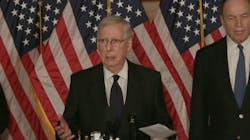Transit industry’s hope for additional COVID-19 financial relief crushed under HEALS Act proposal
Senate GOP leaders released a $1 trillion COVID-19 emergency funding package late July 27 that presented a much narrower stimulus focus than the competing $3-trillion proposal that has been passed by the U.S. House of Representatives.
The Senate Republican’s Health, Economic Assistance, Liability protection and Schools (HEALS) Act includes a second round of $1,200 stimulus checks to individuals if they meet certain criteria, additional Paycheck Protection Program provisions and reduces the amount of supplemental unemployment money recipients can claim from $600 to $200 through the end of September.
Completely missing from the stimulus proposal is financial relief for the transit industry. Both large and small transit agencies and the American Public Transportation Association (APTA) have urged Congress to include up to an additional $36 billion in funding for transit following the $25 billion provided in the Coronavirus Aid, Relief and Economic Security (CARES) Act.
The HEALS Act is seen as a response to the House-passed Health and Economic Recovery Omnibus Emergency Solutions (HEROES) Act. The HEROES Act scope of relief is broader than the HEALS Act and includes $15.75 billion in additional emergency relief for the transit industry.
Negotiations on the HEALS Act with both parties are expected to begin this week.
“The American people are doing their part to combat this deadly disease and the federal government must do its part as well,” said U.S. Sen. Charles Grassley (R-IA). “This legislation serves as a starting point for bipartisan negotiations. I urge my colleagues on both sides of the aisle to not let partisan differences derail progress.”
In response to the Senate GOP leaving transit out of its stimulus proposal, APTA President and CEO Paul Skoutelas said the package ignores both the vital role transit has played during the COVID-19 pandemic and the dire situation the industry finds itself in.
“Public transit agencies need additional funding to continue to provide essential services throughout the crisis and play an indispensable role in America’s economic recovery from COVID-19. These funds will help offset the extraordinary direct costs and revenue losses that public transit agencies continue to suffer as a result of the pandemic and help these agencies continue to avoid layoffs of this critical workforce,” said Skoutelas.
He continued, “Ignoring the essential role public transit has played during these past four months harms communities and the essential employees keeping this country moving during a pandemic. As this process moves forward, I urge Congressional leaders and the administration to include at least $32 billion in the final emergency funding package for our nation’s public transit industry.”
The full text of the HEALS Act is available here.
About the Author

Mischa Wanek-Libman
Group Editorial Director
Mischa Wanek-Libman is director of communications with Transdev North America. She has more than 20 years of experience working in the transportation industry covering construction projects, engineering challenges, transit and rail operations and best practices.
Wanek-Libman has held top editorial positions at freight rail and public transportation business-to-business publications including as editor-in-chief and editorial director of Mass Transit from 2018-2024. She has been recognized for editorial excellence through her individual work, as well as for collaborative content.
She is an active member of the American Public Transportation Association's Marketing and Communications Committee and served 14 years as a Board Observer on the National Railroad Construction and Maintenance Association (NRC) Board of Directors.
She is a graduate of Drake University in Des Moines, Iowa, where she earned a Bachelor of Arts degree in Journalism and Mass Communication.
